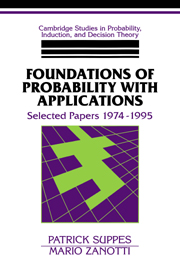Book contents
- Frontmatter
- Contents
- Preface
- Part I Foundations of probability
- Part II Causality and quantum mechanics
- 6 Stochastic incompleteness of quantum mechanics
- 7 On the determinism of hidden variable theories with strict correlation and conditional statistical independence of observables
- 8 A new proof of the impossibility of hidden variables using the principles of exchangeability and identity of conditional distributions
- 9 When are probabilistic explanations possible?
- 10 Causality and symmetry
- 11 New Bell-type inequalities for N > 4 necessary for existence of a hidden variable
- 12 Existence of hidden variables having only upper probabilities
- Part III Applications in education
- Author Index
- Subject Index
6 - Stochastic incompleteness of quantum mechanics
Published online by Cambridge University Press: 05 June 2012
- Frontmatter
- Contents
- Preface
- Part I Foundations of probability
- Part II Causality and quantum mechanics
- 6 Stochastic incompleteness of quantum mechanics
- 7 On the determinism of hidden variable theories with strict correlation and conditional statistical independence of observables
- 8 A new proof of the impossibility of hidden variables using the principles of exchangeability and identity of conditional distributions
- 9 When are probabilistic explanations possible?
- 10 Causality and symmetry
- 11 New Bell-type inequalities for N > 4 necessary for existence of a hidden variable
- 12 Existence of hidden variables having only upper probabilities
- Part III Applications in education
- Author Index
- Subject Index
Summary
INTRODUCTION
The purpose of this article is to bring out in as conceptually clear terms as possible what seems to be a major incompleteness in the probability theory of particles offered by classical quantum mechanics. The exact nature of this incompleteness is illustrated by consideration of some simple quantum-mechanical examples. In addition, these examples are contrasted with the fundamental assumptions of Brownian motion in classical physics on the one hand, and with a controversy of a decade ago in mathematical psychology. (The psychological example is described in detail in the appendix). Our central claim is that classical quantum mechanics is radically incomplete in its probabilistic account of the motion of particles.
In the last part of the article we derive the time-dependent joint distribution of position and momentum of the linear harmonic oscillator, and show how the apparently physically paradoxical statistical independence of position and momentum has a natural explanation. The explanation is given within the framework of the non-quantum-mechanical stochastic theory we construct for such oscillators.
Before entering into any technical details, we shall attempt to spell out in intuitive terms our incompleteness claim. To begin with, there are two senses of completeness that we want to distinguish. One sense of completeness is that demanded by any hidden variable theories of quantum mechanics. States should be found, or be theoretically characterizable at least, that lead to precise values for all observables; that is, no observable is to have a variance greater than zero.
Information
- Type
- Chapter
- Information
- Foundations of Probability with ApplicationsSelected Papers 1974–1995, pp. 67 - 82Publisher: Cambridge University PressPrint publication year: 1996
